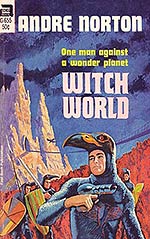
![]() gallyangel
gallyangel
7/14/2012
![]()
Before I read Witch World, I only had a few assumptions to work with since I'd never read Norton before. The first: since she's an acknowledged grandmaster, she gets the benefit of the doubt as a storyteller. Second: judging from the two plus feet of valuable shelve space at the local used bookstore, she was prolific and popular. Third: judging from the one book at the new bookstore, her popularity, and maybe even her relevancy, is waning.
The main character, Simon Tregarth, has a problem. After the war, he went to work for people who, if you cross a certain line in the sand, which shifts around depending on multiple factors, they send in someone and make you dead. Simon has crossed the line and has sent the first two killers back to their master feet first. He has no hope of doing the same with the third.
So, quite by accident, Simon flees to the one city in which this fate can be avoided and the one man which can help him, actively seeks him out.
Norton cleverly weaves in the lore of ancient stones and standing stones and their ability to open gateways to other worlds. 49 years on, that concept is closer to a reality than wide eyed SF gimmickry to move the story alone. Anyway, throwing in a brilliant bit about how others have escaped this way, namely a bunch of those on the loosing side of the last war, Simon is judged and whisked away to a world which will suit him. (I like that bit since there were high level Nazis which did simply go poof, gone for good, never to be seen again.)
Anyway, Simon is now in the Witch World. At first glance this appears to be a medieval lite world, which is both the bane and the backbone of modern fantasy.
But Norton is better than that. As the story unfolds, we find that not only Simon but other invaders have come, bringing some very nasty high tech gadgetry with them. Some of this gadgetry seems to have leaked to all sides, or else it's left over from some high society which fell long long ago.
The story seems very straight forward once Simon gets on the other side of his Stargate. Save the girl, a witch, of course. Enter into service with Estcarp, land of the witches. Learn the basic language in two weeks. Become enmeshed in the various political maneuverings and wars. Simon proves himself both in battle, by surviving, and since he's not of this world, he can do what men in Estcarp can not: engage in witchcraft.
I do like Norton's nonanswer when it comes to the basic workings of witchcraft. She uses the analogy of a potter's wheel. From the clay, through skill and attention comes pottery. From sea and wind, with attention to detail and force of mind, comes the witchcraft of a fog. Simple. It's a mind thing, with the help of various props, if it happens to work that day.
So, the various little kingdoms around Estcarp are either in league with each other or against each other. The high tech villains, who are blood thirsty, ruthless, and comically overconfident, are manipulating things from behind the scenes.
Simon and his new found friends win the battle, with many more to look forward to. The End. Maybe. The ending is, of course, perfectly structured either to be the end of Simon and company, or to be the first of many books.
The question I'm asking myself is this: since this is my first brush with Norton, will I read her again?
This is science/fantasy and I don't think it has aged very well. The SF elements are, from another era and there is no awe there. But the fantasy of magic is suitable restrained and well done. The villains are either simple sketches of common human villainy or comical bloodthirsty idiots from another world. I'm assuming those overconfident fools and how they operate would've been more horrifying to the general SF reading public when the book was first published.
Norton had little touches I appreciated but the story seemed formulaic. Perhaps Norton helped write the formula with books like this.
Will I read more Norton? If she's on one of the lists I'm working through, I'll not hesitate. But I doubt I'd seek her out.
Would I recommend this book? It's light, short, harmless, forgettable, and my copy was cheap. She certainly didn't challenge me, but then again, that's rather a rare feat anyway.